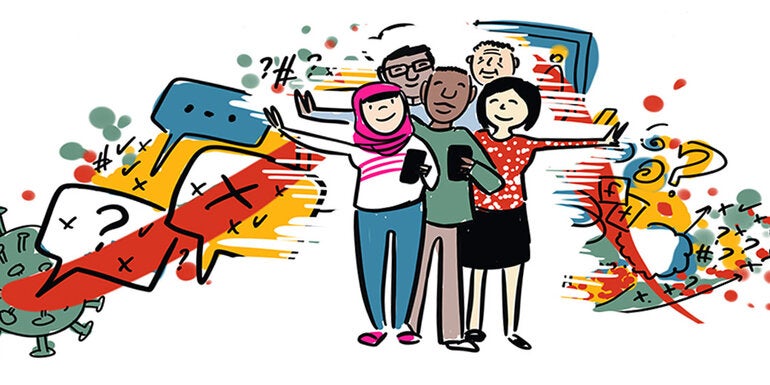
Podcast: ¿What is an infodemic?
This podcast (in Spanish) explores the problems caused by misinformation or disinformation during a pandemic and presents a joint special issue on this topic produced by five scientific journals.
Podcast music produced by Jason Shaw on AudionautiX under Creative Commons Attribution 4.0 International License.
The global community is facing a major challenge as a highly infectious virus is spreading globally. At the same time, a deluge of information, including misleading or false content is spreading even faster through the internet, social networks, and the media, dangerously altering risk perceptions and disseminating false information about the disease, potential cures, and probable sources. There is an increasing awareness that the surge of excessive, false or misleading information may pose new and serious threats to global health that should be adequately tackled through major research efforts and carefully targeted, evidence-based policy interventions.
Due to its consequences at the global scale and its analogies with the transmission mechanisms of a pandemic, the term “infodemic” is used to denote a rapid, large-scale dissemination of all kinds of health information and misinformation. This overabundance of information – some accurate and some not – makes it harder for people to find trustworthy sources and reliable guidance when needed. When an infodemic occurs during an epidemic, its potential threat for public health is significantly amplified and the effectiveness of the response and of public health measures may be jeopardized.
WHO Director-General Tedros Adhanom Ghebreyesus has declared that the world needs to respond to the infodemic, and WHO proposed a holistic approach to infodemic management which applies evidence-based interventions. There is an increasing awareness that a new field of research is needed to cope with the COVID-19-related infodemic and with future health-related crises, a field that requires novel, specialized knowledge from many different existing disciplines, and that can be termed “Infodemiology”. In this context, the WHO has launched an unprecedented collaboration between five scientific journals, which are furthering a global research effort toward understanding the science of infodemiology.
Manuscripts published by the Pan American Journal of Public Health can be freely accessed in full text below. Manuscripts published by the other four scientific journals can be accessed through their websites: Big Data & Society (manuscripts in English); The International Journal of Intelligence, Security, and Public Affairs (manuscripts in English); Health Security (manuscripts in English); Eastern Mediterranean Health Journal (manuscripts in English, Arabic and French)
The journal appreciates the programmatic and financial contributions of the WHO EPI-WIN Infodemic Management in support to this special issue. The journal also acknowledges the support provided by the Editorial Committee, whose contributions helped make the manuscripts more interesting for the readers: Sebastian Garcia-Saisó, Director EIH, PAHO/WHO; Marcelo D'Agostino, Senior Advisor Information Systems and Digital Health, EIH, PAHO/WHO; Eliane Pereira dos Santos, Regional Advisor, Knowledge Management and Networks, EIH, PAHO/WHO; Ian Brooks, University of Illinois, Big Data Science; Walter Curioso, Universidad Continental, Lima, Perú; Diego Gonzalez, Director BIREME, PAHO/WHO; Victoria Malek, International Expert on Data Science; Myrna Marti, International Expert on Information Systems for Health; Felipe Mejía Medina, International Expert on Big Data Analytics; Carlene Radix, Head, Human and Social Division, OECS; Daniel Otzoy, Head, RECAINSA Network; Soraya Zacarias, General-Coordinator CGDI, Ministry of Health, Brazil.
As a special contribution to this issue on infodemiology and a complement to the original articles, we also present below 7 articles (*) on public health misinformation originally published in English in the American Journal of Public Health. We thank the AJPH for their support.
